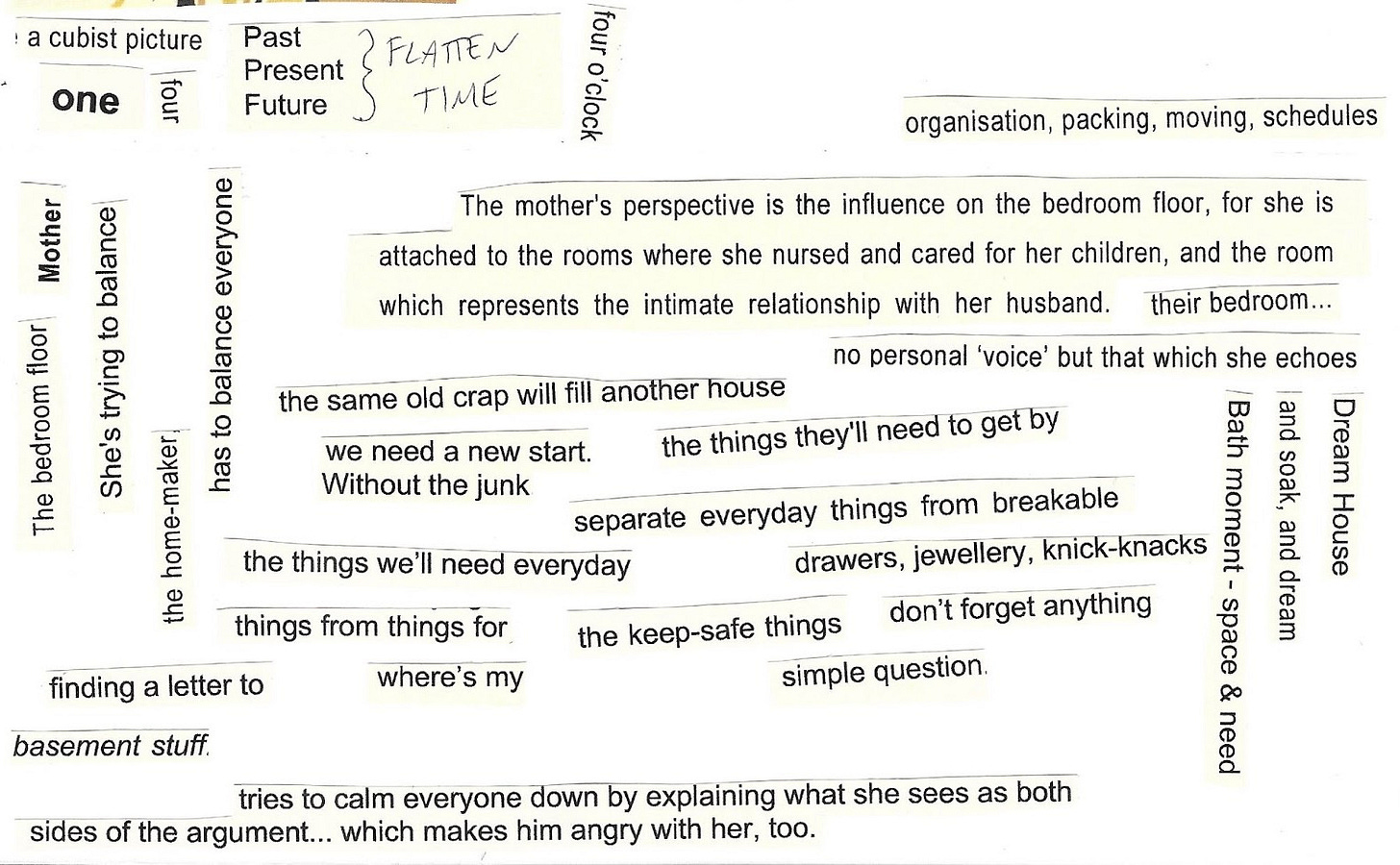A musical called four is the work of theoretical theatre* I’m currently sharing. Click here for the start of the story.
Here is the mother.
(She doesn’t have to be the mother. She doesn’t have to be a ‘she’. In that sense, imagine the character any way it works for you.)
Another of my theoretical shows began when I asked some female friends to share their ‘to do’ lists with me. Suffice to say, that folder is very full of very long lists, such that I had to index the whole thing just to navigate my way through it. (Well, I didn’t have to index it, obviously. Did I mention the autism?)
The mother could have been associated with any aspect of those lists, much of which was about herding people. But when I arranged her words, what stood out to me was apparently stuff. Stuff, stuff, all the packing of the stuff, and the moving of the stuff, all the people with their different stuff, and the stuff they’ll need immediately, and the stuff that might break, and the keep-safe stuff, and the old stuff you come across and linger over, and stuff you have so many of, and stuff from other people, and stuff for other people, and… stuff.
Stuff is overwhelming.
But stuff is also story: to go through someone’s stuff is to read the story of their life, and to go through your own stuff is to revisit, remember, re-evaluate your own life. Especially stuff that’s kept hidden from sight in drawers, chests, wardrobes.
In his book The Poetics of Space, Gaston Bachelard talks about them as…
“... the houses of things: drawers, chests and wardrobes. What psychology lies behind their locks and keys! They bear within themselves a kind of esthetics of hidden things… an empty drawer is unimaginable.”
The discovery of stuff can be magical. Bachelard quotes André Breton’s Revolver aux cheveux blancs:
“L’armoire est pleine de linge. Il y a même des rayons de lune que je peux déplier.”“The wardrobe is filled with linen. There are even moonbeams which I can unfold.”
I have a great love of Secret Things In Small Containers. For ages, I’ve considered setting up shop on Etsy, selling unusual little containers full of lovely, secret things. When I play tabletop games, I like to give the participants small stuff to help bring the story to life, like little pouches with ancient coins, and tiny notes scribbled on parchment.
The mother is the one doing most of the packing in the house. She is revisiting, remembering, re-evaluating everything she finds and wraps and packs.
I have no notes about specific stuff, just the notion of it, and the value of it — from junk, to knick-knacks, to everyday, to keep safe — and her experiencing of it all.
For the show, I imagine seeing every drawer in the house, every chest and wardrobe, every tin and shoebox, every bag, all the containers laid out in an abstract space for exploring, and I imagine us exploring them with her.
I see it all on one huge wall, as if one huge cubist canvas. There are long library ladders on wheels, and single person platforms that rise up and down, and steps that unfold, and drawers that can be stairs.
There are lamps that pull out and move around, and lights that come on when you open that cupboard door, this glove compartment, the fridge. There’s a torch in the pocket of your apron.
We search for loves long lost, reveal exhausted secrets, care for broken keepsakes. She tells us both stories and lies, which are not the same thing. We find things that do not exist but we wish they did, or we dream them into substance.
Here is my invitation to you to be involved now, if you’d like. I’ll put invitations at the end of each part. Respond as and when you want, in whatever manner you like (though ideally with good manners), in the chat or as a comment, on a restack, on other socials, or just in your own thoughts.
Story… In theory, what do you find in these containers? In theory, what story does the mother tell you? In theory, what do you find of your own, inside this house?
There is more to the mother, but that will come later.
Click here to read the previous post: cubism
Click here to read the next post: son
*This may be theoretical theatre, but it’s still protected by Copyright © 2000-2025 by Jenifer Toksvig All Rights Reserved. Though I may be inspired by conversation and ideas, as long as you don’t infringe my copyright, anything you write in response to this belongs to you. Obviously. The Poetics of Space by Gaston Bachelard is translated into English by Maria Jolas, quoted here where referenced for the purposes of researching this work.





